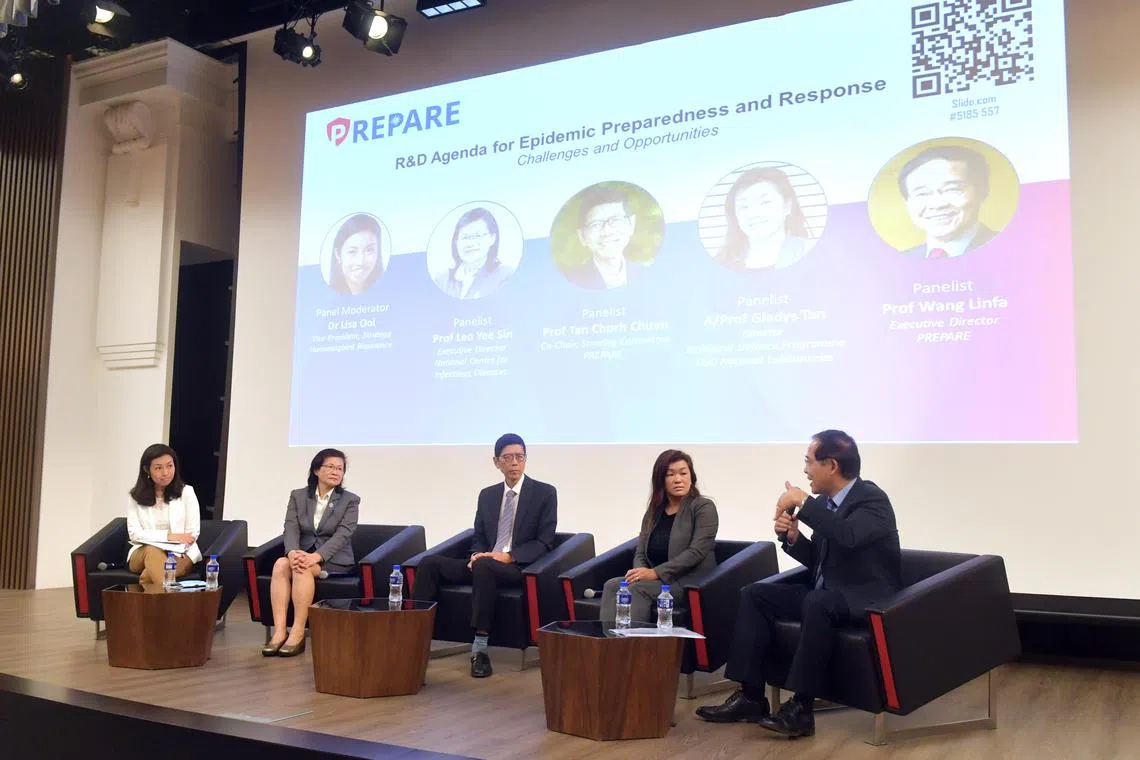National epidemic programme sets target of 100 days to produce rapid test for future outbreaks
Sign up now: Get ST's newsletters delivered to your inbox

A panel discussion at the launch of Prepare included (from left) the moderator, Hummingbird Bioscience's vice-president of strategy Lisa Ooi; NCID executive director Leo Yee Sin; MOH chief health scientist Tan Chorh Chuan; DSO National Laboratories' director for biological defence Gladys Tan and zoonotic disease expert Wang Linfa.
ST PHOTO: ALPHONSUS CHERN
SINGAPORE - The national research programme to tackle future infectious disease outbreaks
The Programme for Research in Epidemic Preparedness and Response, or Prepare, was announced in December 2020
Professor Wang Linfa from Duke-NUS Medical School, who leads the programme, stated the targets on the sidelines of the official launch of Prepare on Thursday.
To combat disease outbreaks the next time a novel pathogen causes a serious international epidemic – a threat called Disease X – Prof Wang said Singapore needs the right infrastructure so that data can be collected and provided quickly to the authorities to make science-guided decisions.
Such data can guide recommendations on not just mask policy, but also what kind of detergent or ventilation to use.
He cited the debate at the start of the Covid-19 outbreak in January 2020 around mask-wearing as an example of how a gap in research had made it difficult for decisions to be made.
“Scientists, politicians and policymakers were debating about whether we need a mask or no mask. This was difficult because we didn’t have the infrastructure set up to do this type of research when a new virus comes in – (to find out) whether it’s airborne, via aerosol transmission or via droplets; or how long a virus will last in a bus or MRT,” said Prof Wang, who is also a zoonotic diseases expert.
One key component in the battle plan is to attract different parties to Singapore, including vaccine and diagnostic companies.
“Many of the biotech companies are looking to move their manufacturing to Singapore,” said Prof Wang. “This is a very, very important part. We need to work with them during peacetime so that we can deliver the 100-day target for a rapid test for whatever Disease X is.”
Professor Tan Chorh Chuan, who co-chairs the Prepare steering committee, said answers and effective solutions are needed in a “very short time”.
“We need therapeutic, diagnostic tests, vaccines, and we need them very fast. The research community in Singapore has actually contributed very significantly to our Covid-19 response,” said Prof Tan, who is chief health scientist at the Ministry of Health.
“But we are now bringing them all together under Prepare in order for us to organise ourselves to further speed up the ability to make sense of new threats and to help us develop solutions to future pandemics.”
During a panel discussion at the launch event, Prof Wang noted that issues like the legal framework for research also need to be sorted out.
He said it took three days to get permission to isolate and sequence the Covid-19 virus after the disease first landed on Singapore’s shores on Jan 23, 2020.
Commenting on that, Prof Tan said one gap Singapore would have to plug would be around the use of data.
“We need to strike a balance between speed of research response with protection of data confidentiality, and this is actually best done outside of (a) pandemic. That’s one area that Prepare will be focusing on to help us with... data access rules and protections during a pandemic,” said Prof Tan, who added that another area to be looked into is the approval process for handling infectious materials in biosafety level 3 laboratories.
None of the eight biosafety level 3 labs in Singapore are equipped to handle dangerous pathogens in such a way that potential treatments and containment strategies can be tested, and vaccines developed.
DSO National Laboratories will open Singapore’s first biosafety level 4 lab by 2025, which would boost local capabilities in dealing with the deadliest diseases.
Prepare said it also hopes to glean early insights from regional partners before an epidemic reaches the region. To build such capabilities, it will strengthen relationships with regional research and clinical partners.
To that end, the programme has already supported the training of eight epidemiologists from countries like Malaysia, Indonesia and Vietnam at a workshop held at the Lee Kong Chian School of Medicine in mid-October.
Correction note: An earlier version of this story attributed the National Centre for Infectious Diseases for Prepare’s aim. That attribution is inaccurate as NCID is just the administrative host of Prepare, and supports just the corporate and administrative functions for the programme. We are sorry for the error.



